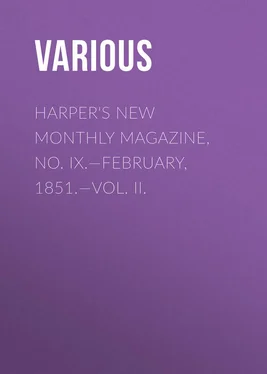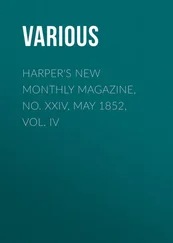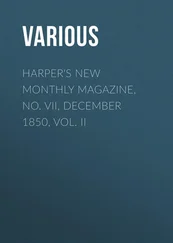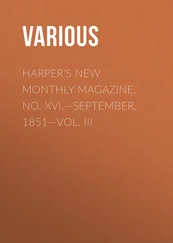Various - Harper's New Monthly Magazine, No. IX.—February, 1851.—Vol. II.
Здесь есть возможность читать онлайн «Various - Harper's New Monthly Magazine, No. IX.—February, 1851.—Vol. II.» — ознакомительный отрывок электронной книги совершенно бесплатно, а после прочтения отрывка купить полную версию. В некоторых случаях можно слушать аудио, скачать через торрент в формате fb2 и присутствует краткое содержание. Издательство: Иностранный паблик, Жанр: periodic, foreign_edu, на английском языке. Описание произведения, (предисловие) а так же отзывы посетителей доступны на портале библиотеки ЛибКат.
- Название:Harper's New Monthly Magazine, No. IX.—February, 1851.—Vol. II.
- Автор:
- Издательство:Иностранный паблик
- Жанр:
- Год:неизвестен
- ISBN:нет данных
- Рейтинг книги:4 / 5. Голосов: 1
-
Избранное:Добавить в избранное
- Отзывы:
-
Ваша оценка:
- 80
- 1
- 2
- 3
- 4
- 5
Harper's New Monthly Magazine, No. IX.—February, 1851.—Vol. II.: краткое содержание, описание и аннотация
Предлагаем к чтению аннотацию, описание, краткое содержание или предисловие (зависит от того, что написал сам автор книги «Harper's New Monthly Magazine, No. IX.—February, 1851.—Vol. II.»). Если вы не нашли необходимую информацию о книге — напишите в комментариях, мы постараемся отыскать её.
Harper's New Monthly Magazine, No. IX.—February, 1851.—Vol. II. — читать онлайн ознакомительный отрывок
Ниже представлен текст книги, разбитый по страницам. Система сохранения места последней прочитанной страницы, позволяет с удобством читать онлайн бесплатно книгу «Harper's New Monthly Magazine, No. IX.—February, 1851.—Vol. II.», без необходимости каждый раз заново искать на чём Вы остановились. Поставьте закладку, и сможете в любой момент перейти на страницу, на которой закончили чтение.
Интервал:
Закладка:
For a day or two, Howard remained unconscious of his danger; feeling only a slight indisposition, easily accounted for by his recent exertions; which he nevertheless so far humored as to keep within doors; until, finding himself one day rather better than usual, he went out to dine with Admiral Mordvinoff. There was a large animated party present, and he staid later than was usual with him. On reaching his lodgings he felt unwell, and fancied he was about to have an attack of gout. Taking a dose of sal volatile in a little tea, he went to bed. About four in the morning he awoke, and feeling no better, took another dose. During the day he grew worse, and found himself unable to take his customary exercise; toward night a violent fever seized him, and he had recourse to a favorite medicine of that period, called "James's Powders." On the 12th of January, he fell down suddenly in a fit – his face was flushed and black, his breathing difficult, his eyes closed firmly, and he remained quite insensible for half an hour. From that day he became weaker and weaker; though few even then suspected that his end was near. Acting as his own physician, he continued at intervals to take his favorite powders; notwithstanding which his friends at Cherson – for he was universally loved and respected in that city, though his residence had been so short – soon surrounded him with the highest medical skill which the province supplied. As soon as his illness became known, Prince Potemkin, the princely and unprincipled favorite of Catherine, then resident in Cherson, sent his own physician to attend him; and no effort was spared to preserve a life so valuable to the world. Still he went worse and worse.
On the 17th, that alarming fit recurred; and although, as on the former occasion, the state of complete insensibility lasted only a short time, it evidently affected his brain – and from that moment the gravity of his peril was understood by himself, if not by those about him. On the 8th, he went worse rapidly. A violent hiccuping came on, attended with considerable pain, which continued until the middle of the following day, when it was allayed by means of copious musk drafts.
Early on the morning of the 20th, came to see him his most intimate friend, Admiral Priestman – a Russianized Englishman in the service of the empress. During his sojourn at Cherson, Howard had been in the habit of almost daily intercourse with his gallant ex-countryman. When taken ill, not himself considering it at first serious, no notice of it had been sent out; but not seeing his friend for several days, Priestman began to feel uneasy, and went off to his lodgings to learn the cause. He found Howard sitting at a small stove in his bedroom – the winter was excessively severe – and very weak and low. The admiral thought him merely laboring under a temporary depression of spirits, and by lively, rattling conversation endeavored to rouse him from his torpidity. But Howard was fully conscious that death was nigh. He knew now that he was not to die in Egypt; and, in spite of his friend's cheerfulness, his mind still reverted to the solemn thought of his approaching end. Priestman told him not to give way to such gloomy fancies, and they would soon leave him. "Priestman," said Howard, in his mild and serious voice, "you style this a dull conversation, and endeavor to divert my mind from dwelling on the thought of death; but I entertain very different sentiments. Death has no terrors for me; it is an event I always look to with cheerfulness, if not with pleasure; and be assured, the subject is more grateful to me than any other." And then he went on to say – "I am well aware that I have but a short time to live; my mode of life has rendered it impossible that I should get rid of this fever. If I had lived as you do, eating heartily of animal food and drinking wine, I might, perhaps, by altering my diet, have been able to subdue it. But how can such a man as I am lower his diet, who has been accustomed for years to live upon vegetables and water, a little bread and a little tea? I have no method of lowering my nourishment – and therefore I must die;" and then turning to his friend, added, smiling – "It is only such jolly fellows as you, Priestman, who get over these fevers." This melancholy pleasantry was more than the gallant sailor could bear; he turned away to conceal his emotion; his heart was full, and he remained silent, while Howard, with no despondency in his tone, but with a calm and settled serenity of manner, as if the death-pangs were already past, went on to speak of his end, and of his wishes as to his funeral. "There is a spot," said he, "near the village of Dauphiney – this would suit me nicely; you know it well, for I have often said that I should like to be buried there; and let me beg of you, as you value your old friend, not to suffer any pomp to be used at my funeral; nor let any monument nor monumental inscription whatsoever be made to mark where I am laid; but lay me quietly in the earth, place a sun-dial over my grave, and let me be forgotten."
In this strain of true Christian philosophy did Howard speak of his exit from a world in which he felt that he had done his work. The ground in which he had selected to fix his everlasting rest, situated about two miles from Cherson, on the edge of the great highway to St. Nicholas, belonged to a French gentleman who had treated him with distinguished attention and kindness during his stay in the vicinity; and, having made his choice, he was very anxious to know whether permission could be obtained for the purpose, and begged his gallant friend to set off immediately and ascertain that for him. Priestman was not very willing to leave his friend at such a time and on such a gloomy errand; he fancied people would think him crazy in asking permission to make a grave for a man still alive, and whom few as yet knew to be ill; but the earnestness of the dying martyr at length overcame his reluctance, and he set forth.
Scarcely had he departed on his strange mission, when a letter arrived from England, written by a gentleman who had just been down to Leicester to see young Howard, giving a highly favorable account of the progress of his recovery, and expressing a belief that, when the philanthropist returned to his native land, he would find his son greatly improved. This intelligence came to the deathbed of the pious Christian like a ray of light from heaven. His eye brightened; a heavy load seemed lifted from his heart; and he spoke of his child with the tenderness and affection of a mother. He called Thomasson to his bedside, and bade him tell his son, when he went home, how long and how fervently he had prayed for his recovery, and especially during this last illness.
Toward evening, Admiral Priestman returned from a successful application; with this result Howard appeared highly gratified, and soon after his arrival retired to rest. Priestman, conscious now of the imminency of the danger, would leave him alone no more, but resolutely remained, and sat at the bedside. Although still sensible, Howard had now become too weak to converse. After a long silence, during which he seemed lost in profound meditation, he recovered for a moment his presence of mind, and taking the letter which had just before come to hand – evidently the subject of his thoughts – out of his bosom, he gave it to the admiral to read; and when the latter had glanced it through, said tenderly: "Is not this comfort for a dying father?" These were almost the last words he uttered. Soon after, he fell into a state of unconsciousness, the calm of sleep, of an unbroken rest – but even then the insensibility was more apparent than real, for on Admiral Mordvinoff, who arrived just in time to see the last of his illustrious friend, asking permission to send for a certain doctor, in whom he had great faith, the patient gave a sign which implied consent; but before this person could arrive he had fallen off. Howard was dead!
Читать дальшеИнтервал:
Закладка:
Похожие книги на «Harper's New Monthly Magazine, No. IX.—February, 1851.—Vol. II.»
Представляем Вашему вниманию похожие книги на «Harper's New Monthly Magazine, No. IX.—February, 1851.—Vol. II.» списком для выбора. Мы отобрали схожую по названию и смыслу литературу в надежде предоставить читателям больше вариантов отыскать новые, интересные, ещё непрочитанные произведения.
Обсуждение, отзывы о книге «Harper's New Monthly Magazine, No. IX.—February, 1851.—Vol. II.» и просто собственные мнения читателей. Оставьте ваши комментарии, напишите, что Вы думаете о произведении, его смысле или главных героях. Укажите что конкретно понравилось, а что нет, и почему Вы так считаете.












